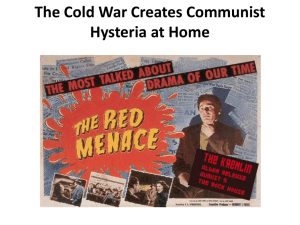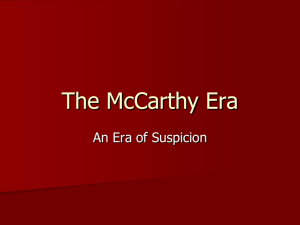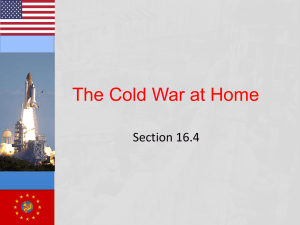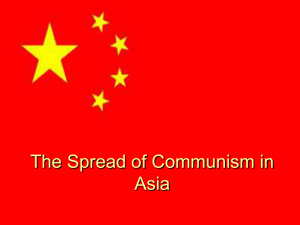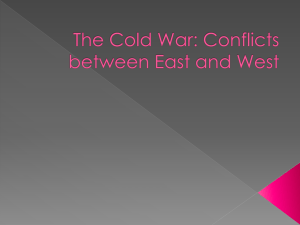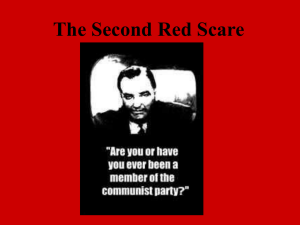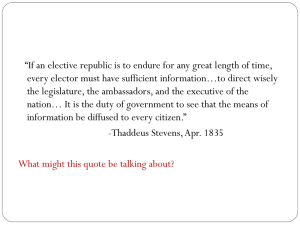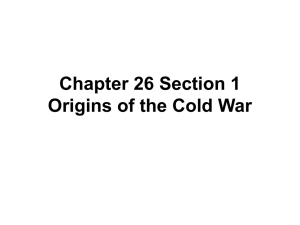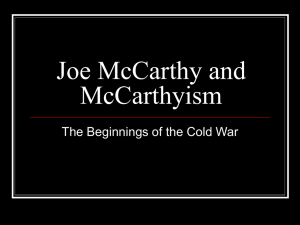Close and Critical-McCarthy Wheeling Speech
advertisement
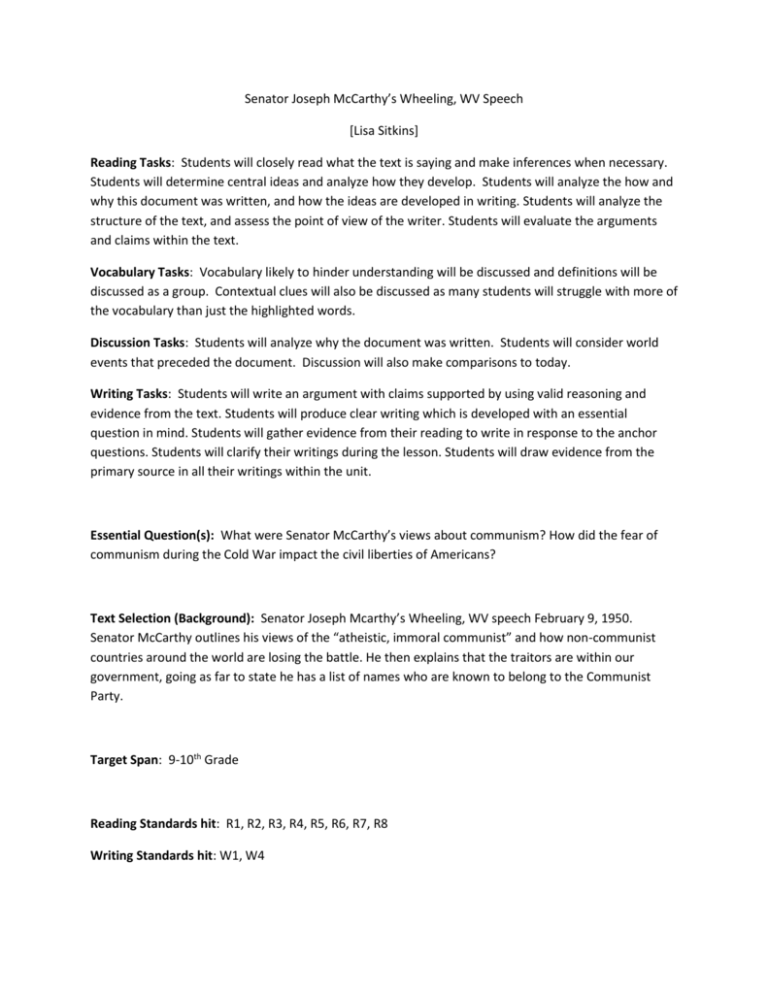
Senator Joseph McCarthy’s Wheeling, WV Speech [Lisa Sitkins] Reading Tasks: Students will closely read what the text is saying and make inferences when necessary. Students will determine central ideas and analyze how they develop. Students will analyze the how and why this document was written, and how the ideas are developed in writing. Students will analyze the structure of the text, and assess the point of view of the writer. Students will evaluate the arguments and claims within the text. Vocabulary Tasks: Vocabulary likely to hinder understanding will be discussed and definitions will be discussed as a group. Contextual clues will also be discussed as many students will struggle with more of the vocabulary than just the highlighted words. Discussion Tasks: Students will analyze why the document was written. Students will consider world events that preceded the document. Discussion will also make comparisons to today. Writing Tasks: Students will write an argument with claims supported by using valid reasoning and evidence from the text. Students will produce clear writing which is developed with an essential question in mind. Students will gather evidence from their reading to write in response to the anchor questions. Students will clarify their writings during the lesson. Students will draw evidence from the primary source in all their writings within the unit. Essential Question(s): What were Senator McCarthy’s views about communism? How did the fear of communism during the Cold War impact the civil liberties of Americans? Text Selection (Background): Senator Joseph Mcarthy’s Wheeling, WV speech February 9, 1950. Senator McCarthy outlines his views of the “atheistic, immoral communist” and how non-communist countries around the world are losing the battle. He then explains that the traitors are within our government, going as far to state he has a list of names who are known to belong to the Communist Party. Target Span: 9-10th Grade Reading Standards hit: R1, R2, R3, R4, R5, R6, R7, R8 Writing Standards hit: W1, W4 Directions/Introduction As written, this lesson will guide students through two days of looking at a historical document. It is meant to be a teachable model, but is freely available to be changed based on your students own unique needs. What should be understood however, is that with the Common Core State Standards covering literacy in Social Studies, we need to give our students rich, complex texts in order to deepen their understanding of our important content, as well as give them opportunities to practice literacy across the content areas. If this is their first time, it may be rough, but students will get better at it the more practice they have. We chose to follow the advice of Mike Schmoker, who, in his book Focus: Elevating the Essentials to Radically Improve Student Learning, recommends that any vocabulary which could hinder a student’s understanding be taught in advance (Schmoker, 2011). The Core standards call for students to be able to identify the meaning of words by the context in which they are used (National Governors Association, 2011), and by pre-teaching the vocabulary here, students still have to do this important step, even though the vocabulary was taught in advance. In trying to provide a research based model, for vocabulary we’re following Marzano. Marzano identifies six steps to teaching vocabulary. We will be combining two steps (provide and restate) and eliminating step 6 which is practicing with games (Marzano & Pickering, 2005). You may adapt the lesson to include this step if you choose. The recommended model for teaching each day is as follows: Preteaching: On February 9, 1950 in a speech at Wheeling, West Virginia Senator Joseph McCarthy from Wisconsin claimed that communists had infiltrated the United States government and that significant numbers worked in the State Department. The Senator wanted to contain the spread of communism within the United States government and at home in America. Some historians mark this speech as the beginning of “McCarthyism” or the witch hunting anti-communist frenzy which engulfed America in the 1950’s. McCarthy did not invent anti-communism. It was a fear which was extensive in American society and predated the post war era. Senator McCarthy, however, intensified the sentiment and used it to further his own ambitious political aspirations. In the process, exaggerated concerns over security gravely compromised American civil liberties. Day 1: Provide Student Handout to students. Their document is complete and should be referred to each day of the lesson. Do the vocabulary instruction as a group and then follow the teacher directions within the document itself. Day 2: Follow the directions in the teacher handout. How you choose to assess this beyond what is provided here is up to you, but a discussion and activity based around the focus question is included in Day 2. Day 1: Teacher Page Text Under Discussion Speech of Joseph McCarthy, Wheeling, West Virginia, February 9, 1950 Ladies and gentlemen, tonight as we celebrate the one hundred forty-first birthday of one of the greatest men in American history, I would like to be able to talk about what a glorious day today is in the history of the world. As we celebrate the birth of this man who with his whole heart and soul hated war, I would like to be able to speak of peace in our time—of war being outlawed—and of world-wide disarmament. These would be truly appropriate things to be able to mention as we celebrate the birthday of Abraham Lincoln. Vocabulary Go over vocabulary terms with your own method. ASK STUDENTS: Who is Joseph McCarthy? disarmament ASK STUDENTS: What is McCarthy contrasting in this paragraph? What is going on in the world at the time of this writing? Five years after a world war has been won, men’s hearts should anticipate a long peace—and men’s minds should be free from the heavy weight that comes with war. But this is not such a period—for this is not a period of peace. This is a time of “the cold war.” This is a time when all the world is split into two vast, increasingly hostile armed camps—a time of a great armament race. Have students read rest of speech on own or in small groups and answer the discussion questions. Then discuss as a whole class. Today we can almost physically hear the mutterings and rumblings of an invigorated god of war. You can see it, feel it, and hear it all the way from the Indochina hills, from the shores of Formosa, right over into the very heart of Europe itself. The one encouraging thing is that the “mad moment” has not yet arrived for the firing of the gun or the exploding of the bomb which will set civilization about the final task of destroying itself. There is still a hope for peace if we finally decide that no longer can we safely blind our eyes and close our ears to those facts which are shaping up more and more clearly . . . and that is that we are now engaged in a show-down fight . . . not the usual war between nations for land areas or other material gains, but a war between two diametrically opposed ideologies. The great difference between our western Christian world and the atheistic Communist world is not political, gentlemen, it is moral. For instance, the Directions for Teachers How does this paragraph relate to paragraph 2? (Cold War – no fighting or firing of guns; hope that we can have the peace if we are aware of what is going on) diametrically ideologies What examples does the author use in the Marxian idea of confiscating the land and factories and running the entire economy as a single enterprise is momentous. Likewise, Lenin’s invention of the one-party police state as a way to make Marx’s idea work is hardly less momentous. Marxian next six paragraphs to explain the differences between nations? (Marx, Lenin, Stalin; not just political, but moral; Christian vs atheist; focuses on difference of religion) Stalin’s resolute putting across of these two ideas, of course, did much to divide the world. With only these differences, however, the east and the west could most certainly still live in peace. The real, basic difference, however, lies in the religion of immoralism . . . invented by Marx, preached feverishly by Lenin, and carried to unimaginable extremes by Stalin. This religion of immoralism, if the Red half of the world triumphs—and well it may, gentlemen—this religion of immoralism will more deeply wound and damage mankind than any conceivable economic or political system. immoralism Karl Marx dismissed God as a hoax, and Lenin and Stalin have added in clear-cut, unmistakable language their resolve that no nation, no people who believe in a god, can exist side by side with their communistic state. Karl Marx, for example, expelled people from his Communist Party for mentioning such things as love, justice, humanity or morality. He called this “soulful ravings” and “sloppy sentimentality.” . . . Today we are engaged in a final, all-out battle between communistic atheism and Christianity. The modern champions of communism have selected this as the time, and ladies and gentlemen, the chips are down— they are truly down. Lest there be any doubt that the time has been chosen, let us go directly to the leader of communism today—Joseph Stalin. Here is what he said—not back in 1928, not before the war, not during the war—but 2 years after the last war was ended: “To think that the Communist revolution can be carried out peacefully, within the framework of a Christian democracy, means one has either gone out of one’s mind and lost all normal understanding, or has grossly and openly repudiated the Communist revolution.” . . . Ladies and gentlemen, can there be anyone tonight who is so blind as to say repudiated What does this quote mean? (communism and democracy cannot survive together) Why does the author use this quote here? (Already made a case for the differences; shows how communist leader WILL NOT work with Christian democracy.) that the war is not on? Can there by anyone who fails to realize that the Communist world has said the time is now? . . . that this is the time for the show-down between the democratic Christian world and the communistic atheistic world? Unless we face this fact, we shall pay the price that must be paid by those who wait too long. Six years ago, . . . there was within the Soviet orbit, 180,000,000 people. Lined up on the antitotalitarian side there were in the world at that time, roughly 1,625,000,000 people. Today, only six years later, there are 800,000,000 people under the absolute domination of Soviet Russia—an increase of over 400 percent. On our side, the figure has shrunk to around 500,000,000. In other words, in less than six years, the odds have changed from 9 to 1 in our favor to 8 to 5 against us. How does this information support the author’s point of view? (Communism is growing faster than we are; if we want to protect our democracy, we need to take action now.) This indicates the swiftness of the tempo of Communist victories and American defeats in the cold war. As one of our outstanding historical figures once said, “When a great democracy is destroyed, it will not be from enemies from without, but rather because of enemies from within.” . . . What is this quote referring to? (People who live in the U.S. will destroy us) The reason why we find ourselves in a position of impotency is not because our only powerful potential enemy has sent men to invade our shores . . . but rather because of the traitorous actions of those who have been treated so well by this Nation. It has not been the less fortunate, or members of minority groups who have been traitorous to this Nation, but rather those who have had all the benefits that the wealthiest Nation on earth has had to offer . . . the finest homes, the finest college education and the finest jobs in government we can give. What word(s) in this paragraph supports the author’s attitude toward the traitors? (glaring, silver spoons) This is glaringly true in the State Department. There the bright young men who are born with silver spoons in their mouths are the ones who have been most traitorous. . . . I have here in my hand a list of 205 . . . a list of names that were made known to the Secretary of State as being members of the Communist Party and who nevertheless are still working and shaping policy in the State State Department Department. . . . As you know, very recently the Secretary of State proclaimed his loyalty to a man guilty of what has always been considered as the most abominable of all crimes—being a traitor to the people who gave him a position of great trust—high treason. . . . He has lighted the spark which is resulting in a moral uprising and will end only when the whole sorry mess of twisted, warped thinkers are swept from the national scene so that we may have a new birth of honesty and decency in government. What action is the author suggesting? (Get rid of all the traitors in government.) Day 2: Ask the students what they remember about the speech from yesterday. Be sure they cover who wrote it, why he wrote it, how he wrote it (tone), and what he believed? Have students use their reading and get with a partner to answer the following questions. Discuss as a class after partner time. o How do Senator McCarthy’s views restrict civil liberties of Americans? o Were/Are there other events in history that have similarities to this issue of limiting communism (containment)? o If you were a Senator who disagreed with Senator McCarthy, what argument can you make (be sure to have some type of support, not just emotional mumbo-jumbo)? o Are there any current global events that relate to this issue? o What kind of limit to civil liberties, if any, do you see we have today? Homework: Was/Is it right to restrict civil liberties at certain times in history or today? Clearly state your opinion and use facts from readings and discussions to support your opinion. Essential Question(s): What were Senator McCarthy’s views about communism? How did the fear of communism during the Cold War impact the civil liberties of Americans? Student Page Text Under Discussion Speech of Joseph McCarthy, Wheeling, West Virginia, February 9, 1950 Ladies and gentlemen, tonight as we celebrate the one hundred forty-first birthday of one of the greatest men in American history, I would like to be able to talk about what a glorious day today is in the history of the world. As we celebrate the birth of this man who with his whole heart and soul hated war, I would like to be able to speak of peace in our time—of war being outlawed—and of world-wide disarmament. These would be truly appropriate things to be able to mention as we celebrate the birthday of Abraham Lincoln. Vocabulary My Thoughts/Notes disarmament Five years after a world war has been won, men’s hearts should anticipate a long peace—and men’s minds should be free from the heavy weight that comes with war. But this is not such a period—for this is not a period of peace. This is a time of “the cold war.” This is a time when all the world is split into two vast, increasingly hostile armed camps—a time of a great armament race. Today we can almost physically hear the mutterings and rumblings of an invigorated god of war. You can see it, feel it, and hear it all the way from the Indochina hills, from the shores of Formosa, right over into the very heart of Europe itself. The one encouraging thing is that the “mad moment” has not yet arrived for the firing of the gun or the exploding of the bomb which will set civilization about the final task of destroying itself. There is still a hope for peace if we finally decide that no longer can we safely blind our eyes and close our ears to those facts which are shaping up more and more clearly . . . and that is that we are now engaged in a show-down fight . . . not the usual war between nations for land areas or other How does this paragraph relate to paragraph 2? Questions I Have material gains, but a war between two diametrically opposed ideologies. The great difference between our western Christian world and the atheistic Communist world is not political, gentlemen, it is moral. For instance, the Marxian idea of confiscating the land and factories and running the entire economy as a single enterprise is momentous. Likewise, Lenin’s invention of the one-party police state as a way to make Marx’s idea work is hardly less momentous. diametrically ideologies Marxian Stalin’s resolute putting across of these two ideas, of course, did much to divide the world. With only these differences, however, the east and the west could most certainly still live in peace. The real, basic difference, however, lies in the religion of immoralism . . . invented by Marx, preached feverishly by Lenin, and carried to unimaginable extremes by Stalin. This religion of immoralism, if the Red half of the world triumphs—and well it may, gentlemen—this religion of immoralism will more deeply wound and damage mankind than any conceivable economic or political system. Karl Marx dismissed God as a hoax, and Lenin and Stalin have added in clear-cut, unmistakable language their resolve that no nation, no people who believe in a god, can exist side by side with their communistic state. Karl Marx, for example, expelled people from his Communist Party for mentioning such things as love, justice, humanity or morality. He called this “soulful ravings” and “sloppy sentimentality.” . . . Today we are engaged in a final, all-out battle between communistic atheism and Christianity. The modern champions of communism have selected this as the time, and ladies and immoralism What examples does the author use in the next six paragraphs to explain the differences between nations? gentlemen, the chips are down—they are truly down. Lest there be any doubt that the time has been chosen, let us go directly to the leader of communism today—Joseph Stalin. Here is what he said—not back in 1928, not before the war, not during the war—but 2 years after the last war was ended: “To think that the Communist revolution can be carried out peacefully, within the framework of a Christian democracy, means one has either gone out of one’s mind and lost all normal understanding, or has grossly and openly repudiated the Communist revolution.” . . . What does this quote mean? Why does the author use this quote here? repudiated Ladies and gentlemen, can there be anyone tonight who is so blind as to say that the war is not on? Can there by anyone who fails to realize that the Communist world has said the time is now? . . . that this is the time for the show-down between the democratic Christian world and the communistic atheistic world? Unless we face this fact, we shall pay the price that must be paid by those who wait too long. Six years ago, . . . there was within the Soviet orbit, 180,000,000 people. Lined up on the antitotalitarian side there were in the world at that time, roughly 1,625,000,000 people. Today, only six years later, there are 800,000,000 people under the absolute domination of Soviet Russia—an increase of over 400 percent. On our side, the figure has shrunk to around 500,000,000. In other words, in less than six years, the odds have changed from 9 to 1 in our favor to 8 to 5 against us. This indicates the swiftness of the tempo of Communist victories and American defeats in the cold war. As one of our outstanding historical figures once said, “When a great democracy is destroyed, it will not be from enemies from without, but rather because of enemies from within.” . . . The reason why we find ourselves in a position of impotency is How does this information support the author’s point of view? What is this quote referring to? not because our only powerful potential enemy has sent men to invade our shores . . . but rather because of the traitorous actions of those who have been treated so well by this Nation. It has not been the less fortunate, or members of minority groups who have been traitorous to this Nation, but rather those who have had all the benefits that the wealthiest Nation on earth has had to offer . . . the finest homes, the finest college education and the finest jobs in government we can give. This is glaringly true in the State Department. There the bright young men who are born with silver spoons in their mouths are the ones who have been most traitorous. . . . State Department What word(s) in this paragraph supports the author’s attitude toward the traitors? I have here in my hand a list of 205 . . . a list of names that were made known to the Secretary of State as being members of the Communist Party and who nevertheless are still working and shaping policy in the State Department. . . . As you know, very recently the Secretary of State proclaimed his loyalty to a man guilty of what has always been considered as the most abominable of all crimes—being a traitor to the people who gave him a position of great trust—high treason. . . He has lighted the spark which is resulting in a moral uprising and will end only when the whole sorry mess of twisted, warped thinkers are swept from the national scene so that we may have a new birth of honesty and decency in government. What action is the author suggesting?
